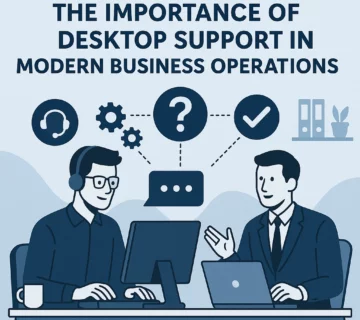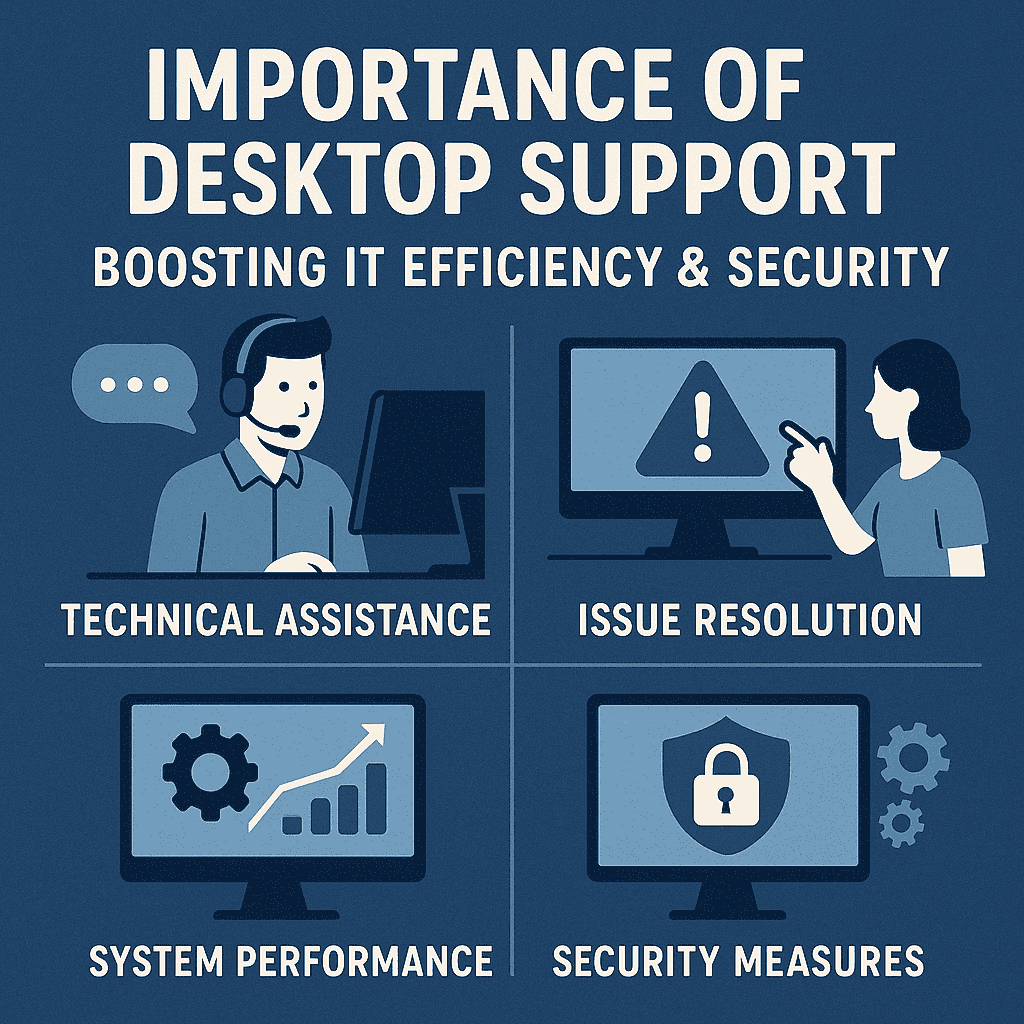How VDI is Transforming Desktop Support
Introduction
Traditional desktop support models, which rely on physical workstations and manual troubleshooting, are becoming obsolete. As organizations shift toward remote work and cloud-based solutions, Virtual Desktop Infrastructure (VDI) is emerging as a game-changer.
VDI enables organizations to host desktops on centralized servers, allowing users to access their environments remotely from any device. This transformation is particularly beneficial for companies looking to enhance their server support services, streamline IT management, and reduce operational costs.
Additionally, as Windows PCs security disaster Microsoft ends support for older systems, businesses must consider future-proof solutions to maintain security and compliance. VDI provides a centralized approach to updates, security patches, and disaster recovery, ensuring organizations stay protected against potential threats.
For businesses facing financial constraints, flexible equipment financing and flexible equipment leasing offer cost-effective ways to transition to VDI. These solutions are particularly valuable for small business equipment investments and equipment financing for startups, enabling companies to upgrade their IT infrastructure without significant upfront costs.
Beyond cost and security benefits, VDI aligns with proactive server management strategies, offering real-time monitoring, automated updates, and robust data protection. It also supports seamless integration with modern communication technologies, such as top business VoIP provider solutions, ensuring employees can work efficiently from anywhere.
As we explore how VDI is transforming desktop support, we’ll cover its benefits, security advantages, cost savings, scalability, and its role in future-proofing business operations.
What is Virtual Desktop Infrastructure (VDI)?
Virtual Desktop Infrastructure (VDI) is a technology that enables organizations to create and manage virtual desktops hosted on centralized servers. Unlike traditional desktop setups, where each workstation operates independently, VDI centralizes all computing resources, allowing IT administrators to manage desktops remotely.
This approach offers several benefits:
- Remote Access – Employees can access their desktops from any device, ensuring flexibility in remote work scenarios.
- Centralized Security – IT teams can enforce security policies and updates across all desktops from a single control panel.
- Reduced Hardware Costs – Businesses can extend the lifecycle of small business equipment by using thin clients or repurposing existing devices for VDI access.
- Improved IT Support Efficiency – Professional server support teams can diagnose and resolve issues remotely, minimizing downtime.
Organizations looking for reliable server solutions for businesses often turn to VDI as it provides enhanced control, scalability, and cost-effectiveness compared to traditional desktop management.
How VDI Enhances IT Support and Server Management
Traditional desktop support involves significant manual effort, with IT teams frequently addressing hardware failures, software updates, and security vulnerabilities on a per-device basis. This approach is not only inefficient but also costly, requiring businesses to invest heavily in outsourced server support or on-premise IT teams.
With VDI, proactive server management becomes significantly easier. IT administrators can automate updates, monitor system performance in real time, and enforce security policies across all desktops from a centralized console. This eliminates the need for outsourced server monitoring, as businesses gain complete visibility and control over their IT environment.
VDI also integrates seamlessly with top business VoIP provider solutions, ensuring employees have access to high-quality communication tools alongside their virtual desktops. By combining VDI with VoIP, businesses can create a unified digital workspace that enhances collaboration and efficiency.
Security Advantages of VDI in Desktop Support
One of the primary concerns for businesses today is cybersecurity. As Windows PCs security disaster Microsoft ends support for older versions, companies must adopt secure alternatives to protect their data and IT infrastructure.
VDI enhances security in several ways:
- Centralized Data Storage – Unlike traditional desktops, where data is stored locally, VDI keeps all files and applications on secure servers, reducing the risk of data breaches.
- Multi-Factor Authentication (MFA) – Organizations can implement MFA to enhance user authentication and prevent unauthorized access.
- Automated Security Updates – IT teams can deploy security patches and software updates across all virtual desktops simultaneously, minimizing vulnerabilities.
- Disaster Recovery and Backup – VDI simplifies disaster recovery, allowing businesses to restore desktops quickly in case of system failures or cyberattacks.
For businesses investing in reliable server solutions for businesses, VDI provides a scalable and secure framework that reduces risks while ensuring compliance with industry regulations.
Cost Savings and Equipment Financing for VDI Implementation
One of the biggest barriers to IT transformation is cost. Many businesses, especially startups, struggle with the financial burden of upgrading their infrastructure. However, flexible equipment financing and equipment financing for startups provide a viable solution.
Businesses can leverage flexible equipment leasing options to acquire the necessary hardware for VDI without high upfront investments. Instead of purchasing new workstations, organizations can invest in cost-effective thin clients or repurpose existing devices, significantly reducing expenses.
VDI also lowers outsourced server support costs, as IT teams can manage desktops more efficiently without needing constant on-site intervention. This results in long-term savings, making VDI a cost-effective choice for businesses of all sizes.
Scalability and Flexibility of VDI
As businesses grow, so do their IT requirements. VDI offers unmatched scalability, allowing organizations to easily add or remove desktops based on their needs. This is particularly beneficial for companies with seasonal workforce changes or remote employees who require on-demand access to virtual desktops.
Moreover, how VoIP improves small business efficiency aligns with VDI’s scalability benefits. Just as VoIP enables businesses to scale their communication infrastructure without significant hardware investments, VDI provides a flexible desktop solution that adapts to changing workforce demands.
By combining VDI with top business VoIP provider solutions, companies can create a fully integrated digital workspace that supports both desktop access and seamless communication.
VDI and the Future of Business IT Infrastructure
The future of IT infrastructure is increasingly centered around virtualization, cloud computing, and automation. VDI is at the forefront of this transformation, offering businesses a secure, cost-effective, and scalable alternative to traditional desktop support models.
With advancements in proactive server management, AI-driven automation, and cloud-native VDI solutions, organizations can expect even greater efficiency in IT operations. Additionally, as cybersecurity threats continue to evolve, businesses will rely more on outsourced server monitoring and professional server support to maintain secure and resilient IT environments.
As more companies embrace remote work and digital transformation, VDI will play a crucial role in shaping the future of business IT infrastructure.
Conclusion
VDI is revolutionizing desktop support by offering centralized management, enhanced security, and cost savings. Businesses looking to optimize their IT infrastructure should consider transitioning to VDI, leveraging server support services, flexible equipment financing, and reliable server solutions for businesses to make the shift seamless.
As cybersecurity threats increase and Windows PCs security disaster Microsoft ends support for older systems, adopting VDI ensures businesses remain secure, scalable, and future-ready. By integrating VDI with top business VoIP provider solutions and how VoIP improves small business efficiency, companies can create a unified digital workspace that drives productivity and growth.
Investing in VDI today positions businesses for long-term success in an increasingly digital world.
FAQs
1. How does VDI improve IT efficiency?
VDI simplifies proactive server management by centralizing desktops, automating updates, and reducing the need for on-site IT support.
2. What are the cost benefits of VDI?
Businesses can leverage flexible equipment leasing and equipment financing startup options to reduce upfront costs while enjoying long-term savings in IT operations.
3. How does VDI enhance security?
VDI reduces endpoint vulnerabilities, implements outsourced server monitoring, and ensures continuous security updates to protect against cyber threats.
4. Is VDI suitable for small businesses?
Yes, VDI provides reliable server solutions for businesses, making it a cost-effective and scalable option for small businesses and startups.
5. How does VDI compare to VoIP in terms of efficiency?
Both VDI and how VoIP improves small business efficiency offer cost savings, remote accessibility, and enhanced IT management for modern businesses.





No comment